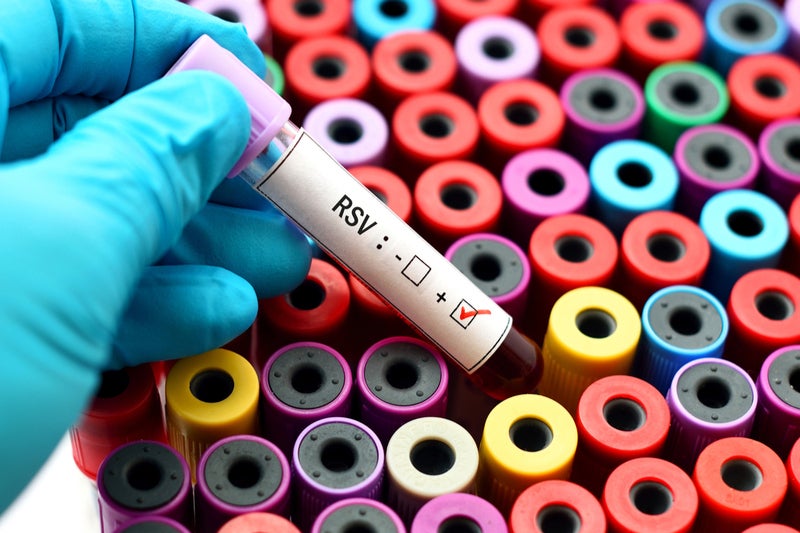Respiratory syncytial virus (RSV) is an RNA virus that causes lung and respiratory tract infections that can be serious in certain individuals, including young children and the elderly.
Synagis (palivizumab) is a prophylactic monoclonal antibody approved for the prevention of RSV infections in high-risk infants, but there are currently no products available for treatment or prevention of RSV infections in other populations.
On 3 October, clinical data from several investigational RSV therapeutics and prophylactics were presented at IDWeek 2019 in Washington DC. Highlights included data from a Phase IIa viral challenge study on the antiviral EDP-938 from Enanta Pharmaceuticals, as well as results from a challenge study with the adenovirus vector vaccine Ad26.RSV.preF from Janssen.
Enanta Pharmaceuticals’ EDP-938 is an investigational antiviral in development for the treatment of medically significant RSV infections. The drug is reported to be a first-in-class, non-fusion N-protein inhibitor, although the exact mechanism of action and its barrier to resistance is yet to be fully elucidated. Previously in a Phase I first-in-human study, EDP-938 was shown to be safe and well-tolerated at single doses up to 800 mg and multiple doses of 600 mg daily for 7 days of treatment. In the Phase IIa study, healthy adult participants were challenged with the RSV-A Memphis 37b strain and monitored for RSV infection before dosing with either placebo, 600 mg EDP-938 daily alternating with placebo, or 500 mg loading dose of EDP-938 followed by 300 mg of the drug twice daily. Results showed that both EDP-938 treatment groups resulted in statistically significant reductions in RSV RNA levels between 71% and 74% compared to placebo. The drug also reduced nasal lavage as detected by quantitative culture and improved upon the total symptom score with favourable safety profiles.
Clinical data were also presented on from a viral challenge study with Janssen’s Ad26.RSV.preF, a replication-incompetent adenoviral vector vaccine using the pre-fusion form of the RSV F protein (RSV Pre-F) as an antigen. Research in the past decade has found that RSV Pre-F induces a more highly immunogenic antibody response relative to the postfusion form. Adult participants were first screened to identify those with low baseline titers of neutralising antibodies against the RSV-A Memphis 37b strain.
After the viral challenge, subjected were evaluated for symptom scores and physical evaluations for up to 11 days, followed by continued monitoring up to 155 days. Resulted showed that immunisation with Ad26.RSV.preF significantly reduced nasal viral load compared to placebo, with many treated patients having zero detectable virus and those with breakthrough infection showing lower average viral load than those treated with placebo. Mean viral load assessed by quantitative culture remained consistently lower for treated groups over 12 days post-challenge. Most importantly, the vaccine had a 51.9% efficacy when the primary endpoint was assessed using conservative symptom criteria, defined as greater than or equal to 2 positive PCRs along with two different symptoms. The vaccine is the first adult RSV vaccine candidate to demonstrate functional protection against upper respiratory disease.

US Tariffs are shifting - will you react or anticipate?
Don’t let policy changes catch you off guard. Stay proactive with real-time data and expert analysis.
By GlobalDataBoth Enanta and Janssen’s products hit their primary efficacy endpoints in challenge studies, and the developers have stated their intent to continue future evaluation of their products in populations at risk for severe RSV disease. Janssen’s AD26.RSV.PreF has the potential to garner significant market share upon approval, particularly given the recent clinical stumbles of Novavax’s ResVax. For EDP-938, clinical trial design and timing of treatment for patients infected with RSV will be key considerations in the planning of a pivotal trial. It will be critical to assess if the ability of EDP-938 to reduce viral load, mucus weight, and symptoms in viral challenge studies can translate into an improvement of disease severity in hospitalised patients with natural RSV infection.
Related reports
GlobalData (2019). Expert Insight: After Second Phase III Failure, is Novavax’s RSV Vaccine ResVax Finished?, March 2019, GDHC2300EI
GlobalData (2019). Expert Insight: AstraZeneca Hopes MEDI8897 Can Rise Above a String of Recent Failures in RSV, February 2019, GDHC2250EI






